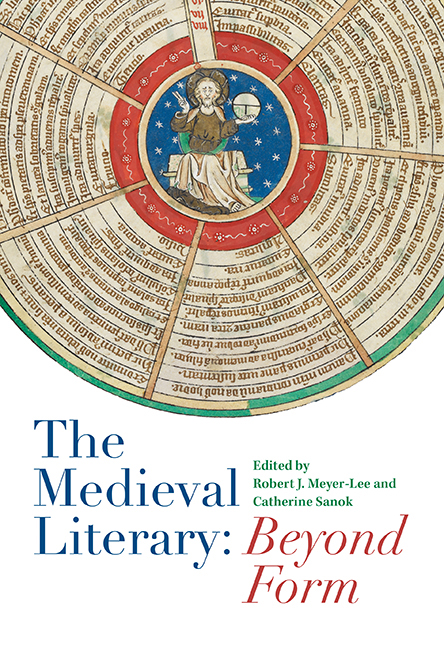Book contents
- Frontmatter
- Contents
- List of Illustrations
- Acknowledgments
- List of Contributors
- List of Abbreviations
- Introduction: The Literary through – or beyond? – Form
- I Instrumental Forms
- 1 What's the Use? Marian Miracles and the Workings of the Literary
- 2 Form's Practice: Lyrics, Grammars, and the Medieval Idea of the Literary
- 3 Forms of the Hours in Late Medieval England
- II Form Performed
- III Temporalities of Form
- Index
2 - Form's Practice: Lyrics, Grammars, and the Medieval Idea of the Literary
from I - Instrumental Forms
Published online by Cambridge University Press: 12 October 2019
- Frontmatter
- Contents
- List of Illustrations
- Acknowledgments
- List of Contributors
- List of Abbreviations
- Introduction: The Literary through – or beyond? – Form
- I Instrumental Forms
- 1 What's the Use? Marian Miracles and the Workings of the Literary
- 2 Form's Practice: Lyrics, Grammars, and the Medieval Idea of the Literary
- 3 Forms of the Hours in Late Medieval England
- II Form Performed
- III Temporalities of Form
- Index
Summary
How did medieval readers understand the category of the literary? I suggest that where today we chiefly define a text as literary according to its form – in the dual sense of genre and style – medieval readers and writers understood the literary as much as a specific kind of practice, albeit one that relied and operated on forms. These two terms, practice and form, often seem antithetical. Pierre Bourdieu asserts that “practice excludes all formal concerns.” To Bourdieu, this is in part because practice is local and contingent, resistant to the totalizing and synchronic forms that make up what he calls “scientific” (i.e., theoretical) inquiry. Practice, an action or set of actions specific to its moment(s) of performance, is in part defined by the particularity of its temporal structure. It aims for results; it responds to circumstances; it selects, discriminates, and organizes. The concept of form, by contrast, tends to abstract and unify. It entered English literary history as a synchronic way of linking literature to a classical past. Early modern writers of treatises on poetics, such as Sir Philip Sidney and George Puttenham, identified and described the genres and rhetorics they found in Virgil, Horace, and Ovid, and critics from John Dryden to John Ruskin organized their aesthetic theories around such forms. These theories have made form and formalist analysis totalizing forces in literary criticism. As Terry Eagleton puts it, “organicist ideologies” undergird much formal analysis, occluding the economic, political, and historical bases for privileging form as the hallmark of the literary. Yet this critique of formalism is itself, of course, historically specific. As I will demonstrate, in the Middle Ages a very different set of relationships among form, practice, and literature obtained.
This essay examines an important but overlooked literary practice of medieval readers and writers, that of dilation: the expansion, interpretation, and clarification of form(s) within the literary work itself. Importantly, dilation depends on a prior act of compression, or to be more precise, on a rhetorical strategy of semantic condensation. While modern readers are often disposed to see compression as the more literary of the two practices, the medieval relationship between compression and dilation was non-hierarchical and discursively continuous; these practices were interdependent and co-constitutive.
- Type
- Chapter
- Information
- The Medieval Literary: Beyond Form , pp. 35 - 60Publisher: Boydell & BrewerPrint publication year: 2018



